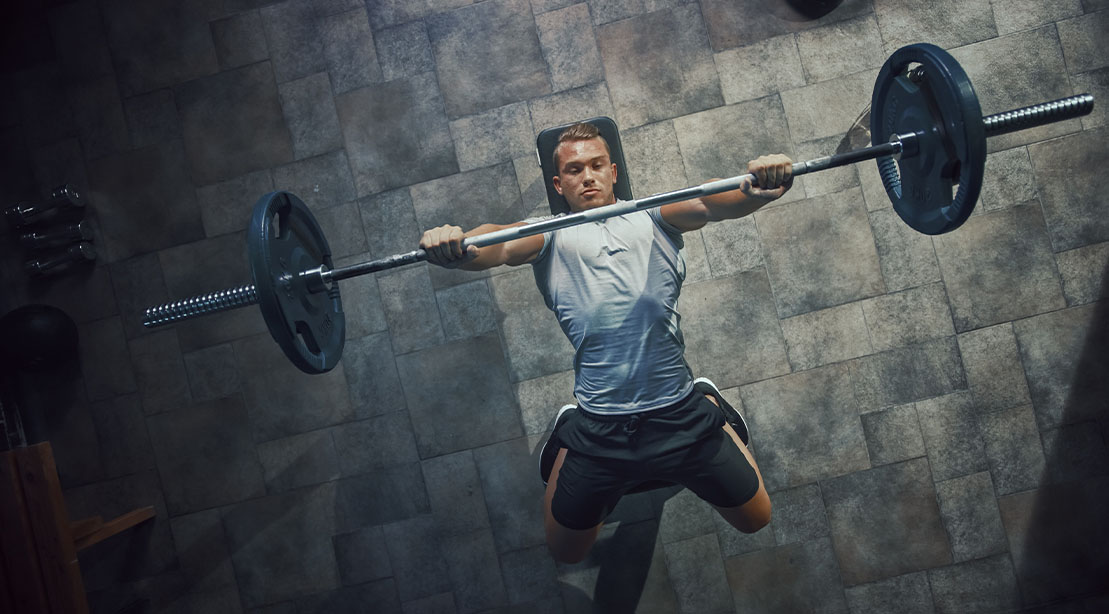28-Days-to-Lean Meal Plan
With the right plan and the right discipline, you can get seriously shredded in just 28 days.
Read article
Most lifters in a weight room are trying to find new ways to build muscle and get stronger. They want to be the one that impresses others in the gym and make people ask what they are doing to make their gains. Anything they can do to give them an edge would be worth the time learning and applying and this is where cluster drop sets training comes in.
Sometimes it is not about doing something new but rather doing something different. Taking established tricks and combining them may be the recipe for success. If swole is the goal and size is your prize, then consider doing that with cluster drop sets.
If you have been following M&F for a while, then you likely know about cluster sets and drop sets already, but some of our newer folks can always benefit from the knowledge.
Cluster sets are a longer and heavier version of a rest-pause set. You take a heavy weight, perform low but manageable reps, take a brief break, and repeat until you have performed a series of these “clusters.” The most popular versions of cluster sets have you perform anywhere from three to five clusters of one to five reps each within a set. They are more popular in strongman and powerlifting training, but some pro bodybuilders that have been in favor of using cluster sets include the late John Meadows, legends such as Branch Warren, Johnnie Jackson, and current pro Nathan Epler.
A drop set calls for you to reach failure with a challenging weight, reduce it to a lighter weight, and continue lifting until you reach failure with the lighter weight. Both clusters and drop sets are strategies that can help you get more overall volume in while taking your muscles beyond an initial form of failure. This can force the muscles to adapt, grow, and get stronger.
This is not something that you should jump into right away. If you have never done clusters or drop sets before, you should try those on their own before advancing up to this. If you feel you are ready for a new and challenging hack for growth, then here is how it works.
After you feel warmed up, load up your barbell or machine with a weight that you could perform for three to five reps. We are going heavy for this.
We will start with the clusters. Get into position and perform two to three reps, then rack the weight. You should not reach failure but feel like that fourth rep could be a challenge. Count 15 seconds. As soon as that 15th second passes, try to get two or three more. Re-rack and count out 15 more seconds. Then, knock out that last rep or two you have in you. By this point, you should be questioning whether you could do another one.
Once you re-rack for the third time, immediately lower the weight. You can reduce it anywhere from 25-50 percent. This is the drop set portion. Get back into position as quickly as you can, take control of the weight and lift to failure. Your spotter should assist you on the final rep. Do not finish on a completed rep unless you are training alone, which is not recommended.
The exercises listed below would be solid options to implement a cluster drop set with as long as you have a spotter to assist you. Compound movements are best since you are going heavy and will have multiple muscle groups involved. You can use this on most machines as well. Dumbbells are not an optimal option, but they can be done if you must train alone, or you can keep multiple pairs close to you without anyone else in your gym needing them. If you’ve never done this type of set before, the list below would be your best bets to try it out.
If you have a weak bodypart that you need to bring up, then this may be the trick for you to kickstart growth. You could realistically use it on multiple bodyparts in your split if you have enough training experience.
It would be best to just do one set of cluster drop sets per workout unless you are very advanced in your training. A good idea would be to use it on the first exercise of the workout when you are at your strongest and have the most energy to commit. Using it for other exercises in the same session may not be the best idea.
Have someone do this with you. Aside from having the spotter for safety, you and the partner can reduce the weight together on barbell or plate-loaded machines. This will both make it even more intense and save time. You and the training partner could also push each other and improve together.
If you adapt this to your programming, you should be able to get at least six reps on the clusters. Make it a goal to get one more rep the next time you train. Once you can do 10 total reps with the heaviest weight before the drop set, it is time to bump it up. Even a five-pound increase would serve you well with this.